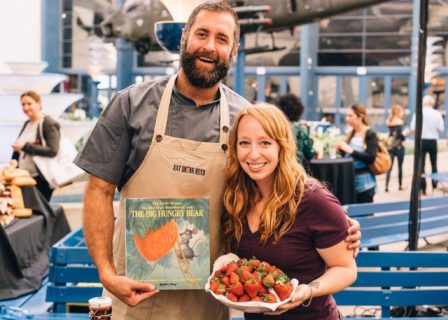What Now?
Reading is Freedom!
If we readers try to imagine how we’d “get by” in life if we couldn’t read – well, we can barely fathom it. Day in, day out, we’re reading: street signs, newspapers (!), memos, web-sites, etc. Yet, as Jose Cruz, CEO of the San Diego Council on Literacy continues to remind us, nearly 200,000 San Diegans have difficulty reading, don’t read, and as a result, fake their way through life.
Tom Conti, a former faker, now says, “To read is the only complete freedom, when you are trying to embrace the thoughts of others, or broaden your own thinking, or, may I add, to enhance, indeed save, one’s own life.”
Cruz, with his team, will soon present “Eat. Drink. Read. A Culinary Event for Literacy.” The party is sure to inspire the need, the yen to read, and our appreciation of this skill and ability. We talked:
LW: “Eat. Drink. Read.” It is now in its ninth year. How did you come up with the idea of pairing “eats” with literacy – other than that food is always a draw?
JC: Nine years ago, we imagined a new kind of fundraiser for literacy; something different; informal – not a gala or an awards event; something simple – and provocative. With leadership from PR veteran Jon Bailey, we imagined Eat. Drink. Read. The idea is to use books and characters as inspiration for chefs’ dishes.
LW: In what ways would you say the organization has grown? Have there been any – or many – changes that you’ve made in how you understand, and address illiteracy?
JC: A high priority is to raise awareness about literacy and instill its importance in the community. We’ve become better at this. With our 32-year history, we continue to evolve and mature. There are now 27 programs in our network of service providers, and this number will grow to 30 in the next few months. The quality and power of our partners: the San Diego Union-Tribune and Dr. Seuss Enterprises, for instance, have
become more impressive.
Our impact is stronger, too, via launching projects that target low-income neighborhoods. We have also increased efforts to bring new books for children who have no books. Last year we distributed 17,000 new books to low-income children, raising the prospects that these children emerge as readers.
LW: Your new radio show, “Literacy for All,” granted to the council by wsRadio, has begun – and you’re the host. What are some of the subjects and guests you’ve aired? Any upcoming programs that you particularly want to cite?
JC: We have featured the “Dyslexia Training Institute,” and “Arts for Learning.” These organizations address students who require particular learning needs. Up for future shows are Kevin Morgan, president/CEO of ProLiteracy (the largest literacy organization in the world), David Lopez, founder of Teach America here, and Gina Gianzero, executive director of DEEP, an award-winning collective impact project in the Diamond Community (Southeast San Diego).
LW: You strike a sad note when you say that literacy skills are more often needed for children and adults in low-income families?
JC: There’s nothing wrong with low-income people that access to resources and opportunities won’t solve. Truly, the main differences between those who read and those who struggle at it is, for the latter, missing ingredients…the things needed to produce successful readers: for instance, prenatal care for expectant mothers, parents who can read and who will read to their children, books in the home, family stability, an emphasis on school attendance.
LW: Those of us who are avid readers find it hard to imagine being illiterate. You must have seen changes in children and adults who “finally” do learn to read. How does this change affect their lives?
JC: For some, learning to read is a miracle, a dream-come-true, the one thing that was missing in their lives. People are shocked to learn that children can disappear, from kindergarten to 12th grade, without anyone knowing that they couldn’t read. It’s a long nightmare, scary, a secret, embarrassing. Imagine the joy, the freedom that comes from finally reading a first book. We’re not talking about a handful of people here. It’s hundreds of thousands of illiterate adults and children. This hurts all of us. Yet, sadly, many who need help do not want to be found. But we are here for them when they are ready.
Our programs serve 179,000 residents of all ages and at no cost. It still takes a village; we have help, but we can use a lot more. Volunteerism, new books for children, and other contributions to literacy programs are, in some ways magic keys that open doors, letting people out and letting people in.
“Eat. Drink. Read. A Culinary Event for Literacy,” will be held at 6 p.m., Thursday, May 17 at the Air & Space Museum in Balboa Park. San Diego’s best chefs will serve dishes inspired by their favorite books and book characters. Tickets are available at https://www.classy.org/san-diego/events/eat-drink-read-2018-culinary-event-for-literacy/e167032 or visit our website at www.literacysandiego.org.

Waypoint Public participates in “Eat. Drink. Read. A Culinary Eent for Literacy”.
Category: Education, Events, Local News







